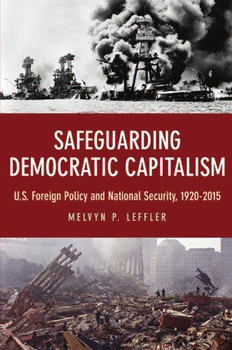
Safeguarding Democratic Capitalism: U. S. Foreign Policy and National Security, 1920-2015 PDF
Preview Safeguarding Democratic Capitalism: U. S. Foreign Policy and National Security, 1920-2015
SAFEGUARDING DEMOCRATIC CAPITALISM Safeguarding Democratic Capitalism U.S. Foreign Policy and National Security, 1920– 2015 Melvyn P. Leffler PRINCETON UNIVERSITY PRESS PRINCETON AND OXFORD Copyright © 2017 by Princeton University Press Published by Princeton University Press, 41 William Street, Princeton, New Jersey 08540 In the United Kingdom: Princeton University Press, 6 Oxford Street, Woodstock, Oxfordshire OX20 1TR press.princeton.edu Jacket photographs: (top) courtesy of Shutterstock; (bottom) FEMA / Alamy Stock Photo All Rights Reserved ISBN 978- 0- 691- 17258- 3 British Library Cataloging- in- Publication Data is available This book has been composed in Adobe Text and Gotham Printed on acid- free paper. ∞ Printed in the United States of America 10 9 8 7 6 5 4 3 2 1 For Sarah and Jake Elliot and Naomi and for Audrey, Carol, and Nava רודל רודמ From Generation to Generation CONTENTS Preface ix Introduction: Embracing Complexity 1 1 The Origins of Republican War Debt Policy, 1921– 1923: A Case Study in the Applicability of the Open Door Interpretation 28 2 Herbert Hoover, the “New Era,” and American Foreign Policy, 1921– 1929 47 3 Political Isolationism, Economic Expansionism, or Diplomatic Realism: American Policy toward Western Europe, 1921– 1933 76 4 The American Conception of National Security and the Beginnings of the Cold War, 1945– 1948 117 5 Strategy, Diplomacy, and the Cold War: The United States, Turkey, and NATO, 1945– 1952 164 6 Adherence to Agreements: Yalta and the Experiences of the Early Cold War 187 7 Victory: The “State,” the “West,” and the Cold War 221 8 Dreams of Freedom, Temptations of Power 243 9 9/11 and American Foreign Policy 281 10 Austerity and U.S. Strategy: Lessons of the Past 303 11 National Security 317 Index 337 vii PREFACE Woodrow Wilson declared war in 1917 hoping that the United States would make the world safe for democracy and capitalism. He wanted to defeat the Central Powers and thwart the rise of Bolshevism. But after the U.S. Senate repudiated the Treaty of Versailles and the League of Nations, and after the Democrats were defeated in the elections of 1920, Republican policymakers embarked upon a sequence of policies that affronted Wilson’s supporters and subsequently garnered much criticism from historians. After World War II, claiming to have learned the lessons of the past, U.S. officials assumed the role of hegemon in the world capitalist economy and projected American power around the globe. For more than forty years they waged a tenacious Cold War against the Soviet Union and world communism. Stunned by the fall of the Berlin Wall in 1989 and the disintegration of the Soviet Union in the early 1990s, Republican and Democratic policymakers sought to consolidate and institutionalize the global ascendancy of democratic capitalism. But fearing isolationist impulses and eschewing the role of global policeman, they pursued inconsistent policies that aroused criticism and perplexed contemporaries. The tragic attacks on 9/11 ended Washington’s ambivalence. President George W. Bush launched a global war on terror with the goal of creating a balance of power in favor of freedom— free people and free markets. In this volume, I have assembled essays that seek to address questions of enduring importance about the course of American foreign relations and the making of U.S. national security policy from the end of World War I to the global war on terror. If Republican officials in the 1920s embraced Wilson’s goal of liberal capitalism, as they did, why did they reject the role of hegemon in the international political economy and why did they refrain from playing a more constructive role in European financial affairs? Why, in particular, did the United States not cancel or reduce the war debts of European allies when so many contemporaries recognized their importance to the resolution of other European political and economic controversies? Likewise, why did the United States fail to guarantee the security of France, and why did it not incur strategic commitments and assume responsibilities commensurate with its power? ix
